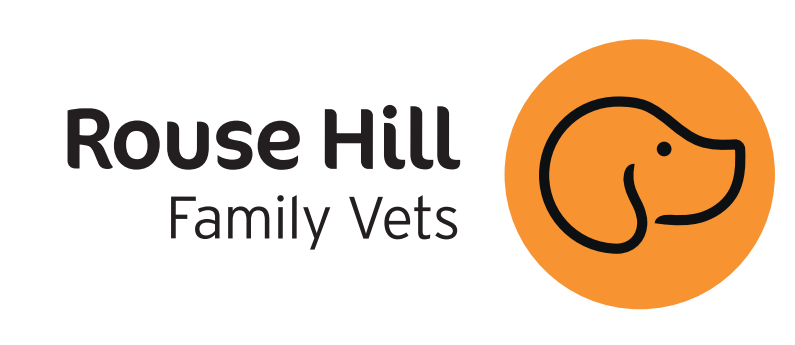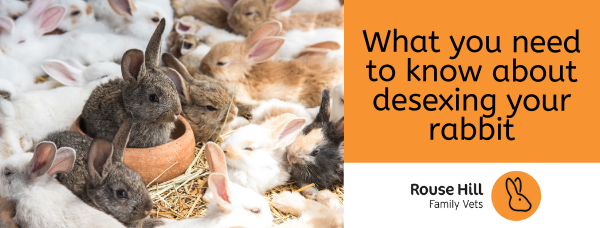Desexing is the surgical sterilisation of rabbits that prevents them from breeding. It is a recommended procedure for all rabbits not intended for breeding purposes. Males undergo castration which is the removal of both testicles from beneath the skin. Females undergo a spay which requires abdominal surgery to remove the uterus. Please note: Due to the nature of this surgery, this procedure can not be reversed.
Benefits of Desexing
- Prevention of unwanted litters
- Health benefits for females such as eliminating the chance of uterine (womb) infections and cancers
- Health benefits for males such as eliminating the chance of testicular cancers
- Behavioural benefits such as reducing spraying, marking, fighting (before the onset of these behaviours)
- Can help to minimise or decrease the risk of rabbits developing aggression towards over rabbits and people
Ideal Age
Desexing is usually recommended between the ages of 4 and 6 months. 6 months is usually better unless contraindicated, as this decreases the risk of anaesthetic complications.
Additional Complications
If you think your rabbit may be pregnant or have a retained testicle (where one testicle has not yet descended) and you have not yet mentioned this to us, please contact us. There are several options in all of these cases, and we need to talk to you to discuss which plan of treatment is best for you and your rabbit.
It’s also important to remember male rabbits are not sterile for approximately 6 weeks after desexing so it is safest to only allow them to socialise with desexed females during this time to avoid accidental pregnancies.
Before Surgery
- Health: Ensure your rabbit has had a vet check-up prior to desexing. Your vet will assess your rabbit’s overall health condition, weight and teeth and will need you to describe your rabbit’s husbandry, food/feeding habits, toilet habits. This will ensure your rabbit is in good health and condition prior to having an anaesthetic.
- NO to Fasting: It is important that your rabbit is eating well prior to anesthetic. A rabbit’s gastrointestinal system must continually move to avoid gut stasis, a life-threatening condition where the intestines stop moving and cause a build-up of faeces and gas. In order to continually move, the gastrointestinal system must have a food supply. Rabbits can not vomit, so there is no risk of your rabbit vomiting during surgery.
- Vaccination and Parasite Control: For the safety of your rabbit and the other patients in our care, it is important that your rabbit’s vaccination schedule and flea control is up to date prior to surgery. If you have any questions about your rabbit’s vaccination history or appropriate parasite control, please contact us.
The Day of Surgery
On the day of surgery, we require your rabbit to be admitted to Rouse Hill Family Vets at an appropriate time given to you. This admission process will take a few minutes as you will be asked questions about your rabbit’s health, and you will also be required to sign an anesthetic consent form. This form describes that no anesthetic or surgical procedure is without some risk to the patient.
Every care is taken to ensure the health and safety of your rabbit. It is our first priority; however, we would be irresponsible not to inform you of the risks involved. If you are uneasy about this procedure or the complications that may arise, please contact us for more information. We are here to help.
Fees
All fees and costs must be paid for on the day of surgery before your rabbit is discharged.
Patient Discharge
When your rabbit is discharged, you will receive discharge instructions from one of our veterinary nurses. Please feel free to ask any questions during the discharge consultation. During your discharge consultation, the nurse will book a follow-up appointment to check on your rabbit’s wound and remove their sutures if applicable.
These appointments occur 3 -5 days post-op and 10-14 days after surgery and are included within the desexing cost unless any additional medication is required. These appointments are with the nurse. If you get home and you have any concerns regarding your rabbit, please don’t hesitate to get in touch.
Pet Pick Up
When you pick your rabbit up, they may be tired and groggy. As such, it is important that they are transported home by vehicle in a secure carrier. Once at home, they need to be kept confined in a warm place to recover. It’s important to remember rabbits overheat very quickly, do not place your rabbit next to a heat source they can not move away from. Placing your rabbit somewhere out of drafts or wind and preferably inside for the first 24 hours will be fine.
The team at the Rouse Hill Family Vets take the relationship with our clients and patients very seriously. We want you to feel at ease entrusting us with your furry family member and are happy to answer any questions at any stage in the process. We take pride in the services we provide and look forward to working with you to supply your pet with the very best of care. Please feel free to call us on 02-9086-9130 to discuss any of your pet’s needs further.
We look forwards to seeing you and your rabbit soon,
Rouse Hill Family Vets

